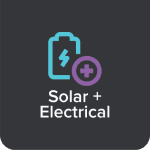HOW CAN WE HELP?
What do I need to start using solar power?
At its most basic, a solar power system consists of photovoltaic (PV) panels, an inverter and the wiring to connect them to each other and to the mains power. The PV panels generate DC (direct current) electricity from sunlight and the inverter converts the DC power into usable AC (alternating
What do the various numbers attached to solar systems mean? (6.6kW, 10.7kW and so on)
These simply refer to the size of the system. The higher the number, the more solar panels there are. More solar panels mean more ability to generate electricity. It is the combined output of power that is generated from your Solar Panels Eg, 15 x 440W Solar Panels is a
What electrical upgrades are typically required to install solar?
This depends upon how old your existing electrical system is, but common upgrades that are carried out alongside installing solar include updating meters (usually done by your electricity supplier), upgrading switchboards and replacing aged wiring.
How long does the installation process of a solar system typically take?
Installing a solar system typically takes one to three days, depending on the size and complexity of the system. This process involves mounting the panels, connecting the system, and finalising all electrical installations and inspections.
What maintenance is required of a solar system after installation?
After installation, your solar system will require some basic maintenance. Clean the panels regularly, check for shade or obstructions, and ensure the inverter is working correctly (usually via your monitoring app). We can carry out regular maintenance and inspections for you.
Does the performance of a solar panel system vary with different weather conditions?
Yes, your solar system’s performance will fluctuate with the weather conditions. On sunny days, you’ll generate more power, while on cloudy or rainy days, output may reduce. However, even indirect sunlight can produce enough energy to power your home or business (depending on your system size).
Can solar panels be installed on any type of roof?
Solar panels can be installed on most roof types. At Solar Plus we consider factors like the roof’s orientation, age and strength; contact us and we’ll customise the perfect solar solution for your needs.
Is it worth investing in a battery for my home or business?
Increasingly, yes. A battery is a great way to ensure you make the most of all the energy you generate through your solar panels and provides energy security in the event of a blackout. Contact us to talk in more detail about the pros and cons of batteries.
Can solar batteries be used during a power outage or blackout?
Yes. Solar batteries provide a backup power source for your home during power outages or blackouts. They allow you to continue using electricity even when the grid is down.
How does the size of my solar panel system affect my choice of solar battery?
The size of your solar panel system determines the capacity of your solar battery. A larger system requires a higher capacity battery to effectively store excess energy.
What solar incentives and rebates are available nationally?
The key federal government incentive in Australia is the Small-Scale Technology Certificates (STCs) program. STCs are issued by the Australian federal government to small businesses and households installing renewable energy systems. The number of certificates you’ll get will depend on your solar system capacity, installation date and your system’s location.
How does a feed-in tariff work?
A feed-in tariff (FiT) is a tariff paid by electricity providers to homeowners and businesses for exporting excess power to the grid. Your electricity plan will include a set rate that your energy providers will pay you for every kWh you export. You receive the amount owed as a credit
What state-based incentives and rebates are available in Victoria?
Victoria is one of the best states in Australia for installing solar power due to the number of incentives available. Key incentives include: To find out what incentives you might be eligible for, visit https://www.solar.vic.gov.au/ or contact us to talk in more detail.
I want to install an EV charger. Will I need to carry out any home upgrades?
Depending on the age of your home, you may find that some upgrades need to be made so your EV charger works properly. These may include: Switchboard upgrades are the most common upgrade required when installing an EV charger. We can advise about any specific upgrades that are required during
What’s the best time of day to charge an electric vehicle?
Generally, it’s best to charge overnight to avoid peak energy usage times like breakfast or dinner times and to take advantage of off-peak energy rates. Your power company will be able to tell you if you can take advantage of an off-peak tariff, or switch you onto a plan which
Can my EV charger be set up to work with my solar panels?
Yes! Several EV chargers feature functionality which allows you to use the surplus energy from your building’s solar panels to avoid high grid energy prices.
Can my EV charger be installed outdoors?
Yes, all reputable EV chargers are weatherproof. Most manufacturers do suggest avoiding areas that are subject to prolonged periods of direct sunlight.
